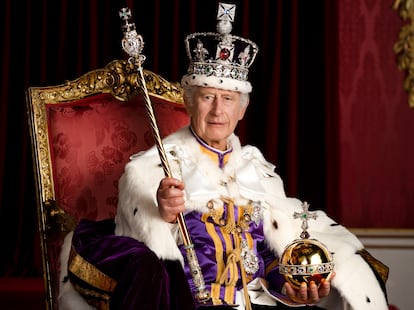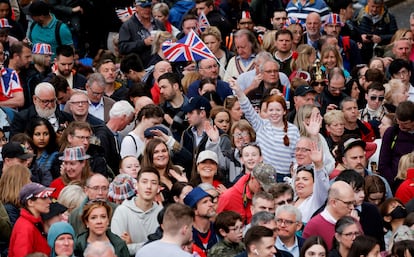Charles III on the anniversary of his mother’s death: Continuity with discreet political gestures
The monarch has assumed the role of neutrality exercised by Elizabeth II, leaving the reforms that the British royal family requires to his heir Prince William

Elizabeth II’s final Christmas message was a reflection on the deep family and religious meaning that the festive period meant to her. The first Christmas message delivered by Charles III made specific mention of “health and social care professionals, our teachers and indeed all those working in public service,” when many of them were struggling to find ways “to pay their bills and keep their families fed and warm […] at this time of great anxiety and hardship.” At the time of Charles’ speech, the conservative government of Rishi Sunak was giving doctors, nurses, teachers, and public transportation employees a hard time. Downing Street was reluctant, for fear of fueling inflation, to raise wages that had been frozen for over 10 years.
September 8 marks the first anniversary of the death of Elizabeth II and the accession to the throne of her son. The new monarch understood, after a lifetime of waiting as heir, that his time on the throne should serve to leave a legacy of stability and continuity. The reforms required by the institution will fall to Prince William. “The Queen represented continuity in a unique way, as we could see in her message, during the confinement of the pandemic, when she quoted Vera Lynn and her legendary ‘We’ll meet again’ from the times of World War II,” Richard Fitzwilliams, one of the leading experts on British royalty, explains to EL PAÍS. “Charles III has been able to symbolize that continuity during his first year. He has shown that he understands a role for which he has been preparing for 70 years.”
The monarch’s desire to prolong the institutional balance inherited from his mother has not prevented him, discreetly and temperately, from making it clear that his reign will have more political overtones.
To the chagrin of Eurosceptic conservatives and Northern Irish unionists of the Democratic Unionist Party, Charles III received the President of the European Commission, Ursula von der Leyen, on February 27 at Windsor Castle, hours after she and Sunak had signed the Windsor Framework, which put an end to an acrimonious dispute between London and Brussels over the Northern Ireland Protocol, the treaty intended to fit the region into the post-Brexit era. “It is not very wise from a constitutional point of view to involve the king in a matter that continues to generate a lot of political controversy,” Jacob Rees-Mogg, one of the Conservative Party’s most belligerent anti-EU politicians, said at the time. Although Buckingham Palace attributed the idea of the meeting to the Sunak government, the monarch was delighted to receive the EU representative, in a gesture that helped repair a relationship that had soured in recent years.
In the same vein, the first international trip undertaken by Charles III and his wife, Camilla, was to Germany on March 31. It had been almost eight years since Elizabeth II’s overseas engagements had been halted, due to her increasingly reduced mobility. No British monarch had set foot on continental soil after the 2016 Brexit referendum. Charles, who had to postpone a visit to France that was included in his itinerary because of street protests surrounding the reform to the pension system, thus regained the diplomatic purpose of bridge-building traditionally attributed to the royal house.
“Most of these events are usually very diluted, but this visit had a very concrete context and content, so it gained relevance. The King’s speech in the Bundestag, read partly in German, helped reinforce a message of reconciliation. The whole context of the visit was a message inviting us to look forward, especially after Brexit,” says constitutional historian Craig Prescott, a professor at Royal Holloway, University of London, who is currently writing a new book, Modern Monarchy.
The climate cause
If there is one cause to which Charles III feels particularly inclined - after suffering the criticism, indifference, and derision of the British press for many years - it is the defense of the environment. The urgency of climate change has turned the monarch into a leader whose impetus is sought at the international level. This was conveyed to him by U.S. President Joe Biden at the COP26 Climate Change Conference in Glasgow in 2021, when Charles was still heir to the throne.
The decision of the short-lived Prime Minister Liz Truss to recommend that the king not travel to the COP27 meeting in Sharm-el-Sheikh in November last year, two months after the death of Elizabeth II, irritated Charles III. He complied silently, obliged in his new role as king to accept the wishes of the government, but began to plot his response. In early November, days before the climate summit in Egypt began, he organized his own mini-climate conference at Buckingham Palace, to which he invited more than 200 politicians and activists. The U.S. government’s climate change envoy, John Kerry, and the president of the Glasgow COP26, Alok Sharma, were there. And, of course, Sunak, whom the monarch has not stopped pressuring since the prime minister implied that the fight against global warming was not among the priorities of his mandate.

A popular coronation
Charles rubbed many Conservative MPs and Lords up the wrong way when he decided not to invite them to his coronation on May 6. Their seats, both in Westminster Abbey and on the steps set up in front of Buckingham Palace, were assigned to hundreds of National Health Service workers, military veterans, activists, and volunteers from philanthropic organizations. “Charles may be quirky and irritating,” political analyst Martin Fletcher wrote in The New Statesman, a center-left magazine, “but unlike most of the Tory governments of the past decade he’s decent and compassionate person.”
British support for the monarchy stands at 62%, according to the most recent YouGov poll. It peaked shortly after Elizabeth II’s death at 67%. However, the generational divide on the issue is significant. Only 37% of those aged between 18 and 24 surveyed want the UK to remain a monarchy. Charles III’s popularity, though much higher than it has been for years, still lags far behind that of his son and heir, William, and his wife, Kate. This is the most obvious sign that a majority of Britons appreciate the king’s performance, but continue to view him as a transitional figure.
Sign up for our weekly newsletter to get more English-language news coverage from EL PAÍS USA Edition
Tu suscripción se está usando en otro dispositivo
¿Quieres añadir otro usuario a tu suscripción?
Si continúas leyendo en este dispositivo, no se podrá leer en el otro.
FlechaTu suscripción se está usando en otro dispositivo y solo puedes acceder a EL PAÍS desde un dispositivo a la vez.
Si quieres compartir tu cuenta, cambia tu suscripción a la modalidad Premium, así podrás añadir otro usuario. Cada uno accederá con su propia cuenta de email, lo que os permitirá personalizar vuestra experiencia en EL PAÍS.
¿Tienes una suscripción de empresa? Accede aquí para contratar más cuentas.
En el caso de no saber quién está usando tu cuenta, te recomendamos cambiar tu contraseña aquí.
Si decides continuar compartiendo tu cuenta, este mensaje se mostrará en tu dispositivo y en el de la otra persona que está usando tu cuenta de forma indefinida, afectando a tu experiencia de lectura. Puedes consultar aquí los términos y condiciones de la suscripción digital.









































